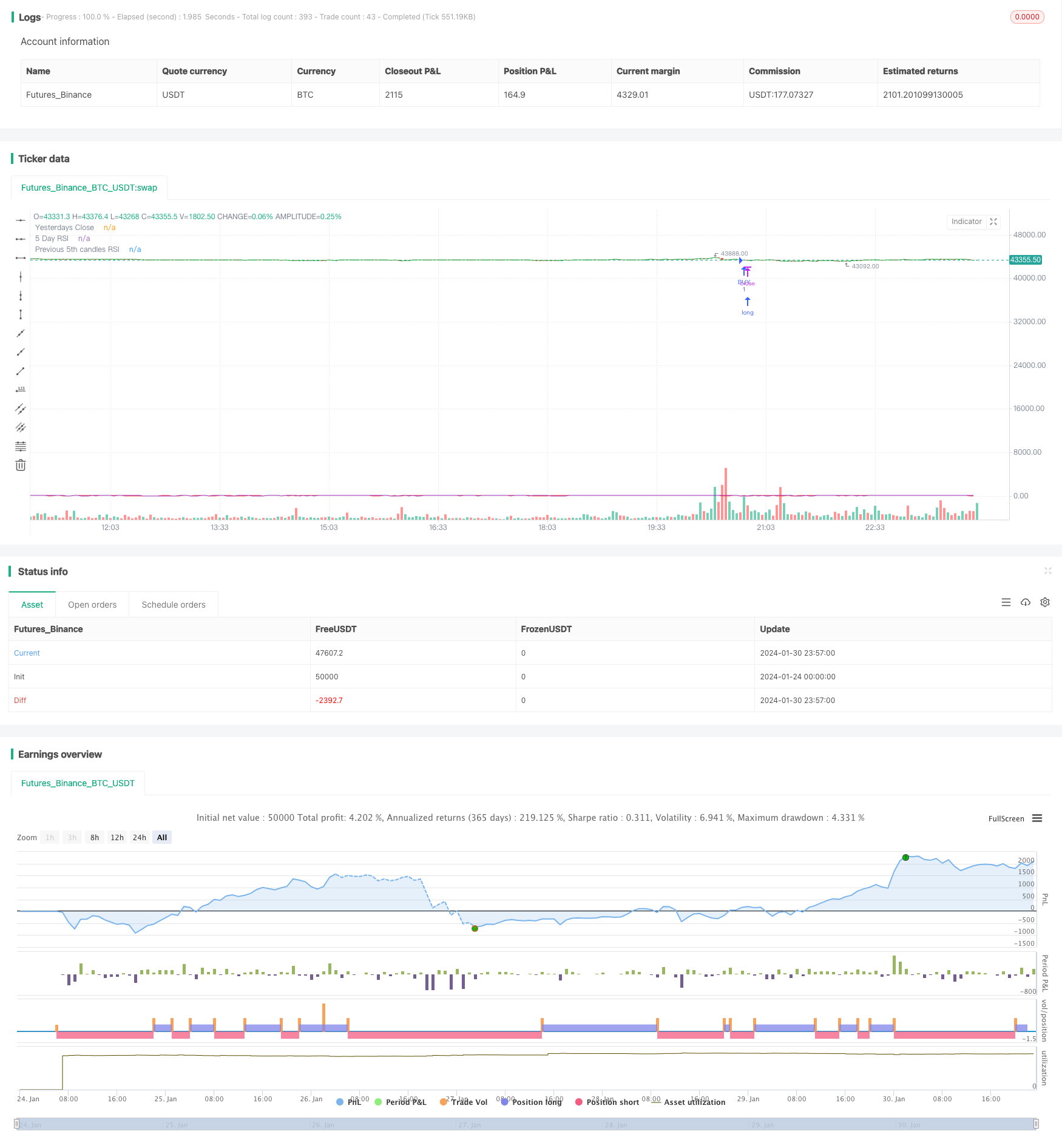
概述
本策略主要利用5日RSI指标与200日移动平均线的结合,形成交易决策信号,属于技术指标组合策略。其主要交易原理是:当价格运行到超买超卖区域时,信号卖出;当价格跌至超卖区域时,信号买入。该策略最大优势是策略信号比较明确,回撤风险较小。但也存在只利用单一技术指标组合形成交易决策的局限性,可通过多因子模型与机器学习算法等进行优化。
策略原理
本策略主要利用5日RSI指标与200日移动平均线的结合,判断价格运行的超买超卖区域,形成交易决策:
5日RSI指标判断价格运行的超买超卖区域。设置超买线为72,超卖区域为30。当RSI指标由下向上突破30时产生买入信号;当RSI指标由上向下跌破72时,产生卖出信号。
200日移动平均线判断价格中长线趋势方向。当价格低于200日均线时,为价格下行阶段;当价格高于200日均线时,为价格上行阶段。
结合1、2判断,本策略iault时5日RSI指标超买并下破72时卖出,5日RSI下破30时并且价格低于200日均线时买入。
策略优势
策略信号比较明确,利用RSI指标 Judgment区域判定超买超卖信号。
200日均线判断大趋势方向,避免逆势操作。
可设置最大持仓数,有利于控制风险。
策略参数优化空间大,可调整RSI参数与均线参数。
回撤风险较小,可效控制策略最大回撤。
策略风险
仅利用RSI指标与均线指标,策略信号可能不稳定,存在多头空头震荡市买卖亏损风险。
需优化和测试RSI参数与均线参数,以取得更好策略效果。
可引入别的指标或模型判断,优化策略信号。如引入波动率指标、机器学习判断等。
策略优化方向
利用更多指标组合判断。如MACD,KD,波动率指标等。
增加机器学习模型判断。如LSTM判断交易信号稳定性。
增加量化因子。如交易量变化、资金流向等判断资金面因子。
优化策略参数。如RSI参数、均线参数等。
优化止损机制。如移动止损、时间止损等。
总结
本策略主要运用5日RSI指标与200日均线指标组合判断价格超买超卖区域,形成交易信号,属于技术指标组合策略。策略信号比较明确,最大回撤风险较小。但可通过多指标组合与机器学习判断等进一步优化,以提高策略效果。
/*backtest
start: 2024-01-24 00:00:00
end: 2024-01-31 00:00:00
period: 3m
basePeriod: 1m
exchanges: [{"eid":"Futures_Binance","currency":"BTC_USDT"}]
*/
// This source code is subject to the terms of the Mozilla Public License 2.0 at https://mozilla.org/MPL/2.0/
// ©chewyScripts.
//@version=5
strategy("96er RSI+200EMA Strategy + Alerts", overlay=true)
// This works best on a small account $100, with 50% of equity and up to 10 max open trades.
// 96% Profitable, turns $100 into $350 in 1 month. very few losses. super happy with it.
// So far it triples the account on a 1m chart in 1 month back testing on the SEI-USD pair.
// I did not test on FX pairs or other instruments.
// had some issues with the inputs not working so had to hard code some, also the lastClose var sometimes breaks and starts following every candle, not sure why.
in_r1 = input.int(5,"5 day input or RSI1")
in_openOrders = input.int(3,"max open orders")
in_lowerRSI = input.int(30,"RSI Lower")
in_upperRSI = input.int(72,"RSI Upper ")
in_emaperiod = input.int(200,"EMA Period")
in_buybreakout = input.int(50,"Buy breakout range")
in_buyTP = input.float(1.05,"Buy TP: 1+TP %, .05 seems to work well.")
in_sellTP = input.float(0.9850, "Sell TP: 1-TP%. .025 seems to work well. ")
simple int rsi5 = in_r1
// 3 rsi strategy , when all of them are overbought we sell, and vice versa
rsi7 = ta.rsi(close,rsi5)
lastClose = request.security(syminfo.tickerid, "D", close, lookahead = barmerge.lookahead_on)
rsi3 = ta.rsi(close[5],rsi5)
ma = ta.ema(close,in_emaperiod)
plot(rsi7,"5 Day RSI",color.red)
plot(lastClose,"Yesterdays Close",color.green)
plot(rsi3,"Previous 5th candles RSI",color.purple)
// sell condition
//sell = ta.crossunder(rsi7,70) and ta.crossunder(rsi14,70) and ta.crossunder(rsi21,70)
//buy condition
//buy = ta.crossover(rsi7,in_lowerRSI) and close < ma and rsi3 <= in_upperRSI and strategy.opentrades < in_openOrders
//sell = ta.crossunder(rsi7,in_upperRSI) and close > ma and rsi3 >= in_lowerRSI3 and strategy.opentrades < in_openOrders
buy = ta.crossover(rsi7,in_lowerRSI) and close < ma and close < lastClose and strategy.opentrades < in_openOrders
sell = ta.crossunder(rsi7,in_upperRSI) and close > ma and close > lastClose and strategy.opentrades < in_openOrders
var lastBuy = close
var lastSell = close
if (buy)
strategy.entry("BUY", strategy.long)
lastBuy := close
alert("Buy")
if ((close >= lastBuy*in_buyTP ) or rsi7 > in_buybreakout and close >= lastClose and (close >= lastClose*in_buyTP or close >= lastBuy*in_buyTP ) )
strategy.close("BUY", "BUY Exit")
alert("Buy Exit")
if (sell)
strategy.entry("SELL", strategy.short)
lastSell := close
alert("Sell")
if ( close < ma and (close <= lastSell*in_sellTP ) or (close < lastClose*in_sellTP) )
strategy.close("SELL", "Sell Exit")
alert("Sell Exit")